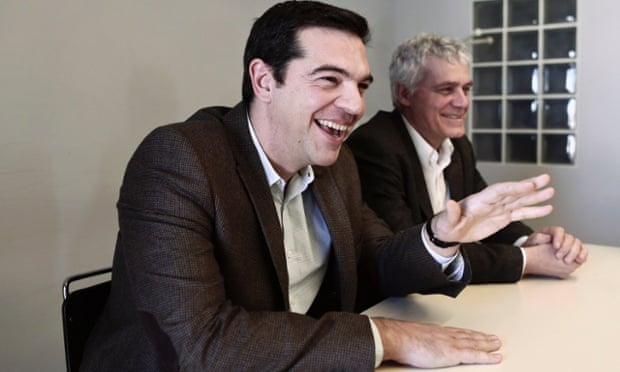Helena Smith in Athens Sunday 11 January 2015
With two weeks until Greece votes, Antonis Samaras needs a miracle to defeat Alexis Tsipras’s radical left party, say pollsters
Syriza leader Alexis Tsipras, left, has a poll lead of up to 4% with a fortnight to go until the election. Photograph: Alkis Konstantinidis/Reuters

With elections barely two weeks away and every poll against him, Greek prime minister Antonis Samaras began to sing from a different hymn sheet this weekend, focusing on his government’s handling of the economy in a desperate bid to win round voters.
Unveiling a plan of national growth and reform in Athens on Saturday and dropping claims that a vote for the left-wing Syriza party would lead Greece into chaos, the premier sought to convince Greeks that only his conservative New Democracy party could guide the crisis-plagued country to economic recovery.
“The strategy of fear that the conservatives have campaigned on clearly hasn’t worked,” said Paschos Mandravelis, a prominent political commentator. “Greeks are not buying the theory that the opposition poses a danger, so now Samaras is altering course.”
The change of tactics for the snap elections forced on the government by parliament’s failure to elect a president, comes at a critical juncture. In every opinion survey, Syriza is in the lead. Last week, for the first time, pollsters began to speak of the impossibility of the lead being overturned. Less than three years after he took office at the helm of a coalition and at the height of Greece’s economic crisis, it was going to take a miracle for Samaras, 63, to keep power.
“The difference is between a rough three and four percentage points and I don’t see it closing,” said professor Dimitris Keridis, who teaches political science at Athens’s Panteion University. “Samaras is facing the inevitability of defeat,” he told the Observer.
A Metron Analysis poll released late on Friday showed Syriza leading, with 27.1% against 23.8% for Samaras’s New Democracy. Between 9 and 16% of voters are undecided.
But even if the conservatives drum up support among the undecided, few believe the radical leftists – once on the fringe of Greek political life but now centre stage and determined to change economic debate in Europe – will not emerge on top on 25 January. On the back of pledges to repudiate the onerous conditions of the EU- and IMF-sponsored bailout accords that have shored up the debt-stricken Greek economy but have brought ordinary Greeks to their knees, Syriza has seen its popularity soar. Its belief that Athens’s unsustainable debt load should also be written off has won applause from other hard-left groups in Europe.
“The question is not if they win, but by how much,” said Mandravelis.
Prime minister Antonis Samaras at an election rally in Halkida. He has crisscrossed the country, sometimes visiting several cities a day. Photograph: Angelos Christofilopoulos/Demotix/Corbis
In stark contrast to Syriza’s Alexis Tsipras, who at 40 is the country’s youngest political leader and has waged a relaxed campaign, Samaras has frantically crisscrossed Greece, often visiting several cities on a single day. Until now, his rhetoric has been based solely on sounding the alarm. If Greeks vote for Tsipras and his “drachma lobby” party, Athens will face the danger of almost certain ejection from the Eurozone – and by extension the EU. “It will mean the loss of all the sacrifices Greeks have made since the crisis began and be a catastrophe for the economy,” Samaras has maintained.
Senior figures in the EU have backed up that view, saying in no uncertain terms that a vote for Tsipras is a vote for danger, replete with uncertainty and risk.
But with more than 25% of Greeks out of work and close to three million facing poverty, the EU interventions have led increasingly to accusations of interference. Five years into their worst crisis in living memory, the vast majority no longer care about creditors’ demands but rather their ability to survive.
“I am seriously thinking of voting for Syriza because I am sick of all the scaremongering from people who brought us to this place,” said Elena Christodoulaki, a hairdresser in Athens, adding that at 64 she had never supported the alliance of Marxists, Maoists, Trotskyists and Greens. “It’s not just that I want to see a change. With all this talk of leaving the euro it has been very difficult for them [the radical leftists] to have a say or [expound on their beliefs] which makes me mad.”
On Friday, parties unveiled their campaign lists, with the conservatives announcing that a former talk show host, a model and an actor would be running as candidates. Syriza’s ticket includes academics based abroad including Costas Lapavitsas, an economics professor at the School of Oriental and African Studies in London, who has become a prominent advocate of resolving Greece’s woes within the Eurozone.
“Europe has failed to have a constant voice in its approach to Syriza,” said Keridis. “There have been a lot of contradictory statements regarding the threat the leftists represent for the Eurozone,” he added. “That has helped Tsipras dilute any fear that he is anti-European and allowed him to win support.”
![The [Greek] European Tragedy](https://blogger.googleusercontent.com/img/b/R29vZ2xl/AVvXsEiWKI5s90SFm1wWTk6bs4p7CgslaC2SnYPsrZhb-B-smOufNNCSxCvpBLI9hOB-LsXZjir_PNmEiMk2-E62F3xkg96IoC6QFAaZAnPRTVH340IN9WBRmWJqPkjWlgyRj3zpALp7h6hvA58/s920/GkBack_new.jpg)
